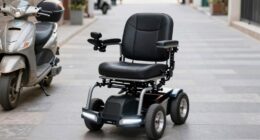When taking care of someone with dementia, it is crucial to recognize signs of impaired judgment and reaction times in order to determine when it is appropriate to take away their keys. If they display increased confusion, experience near-misses while driving, or have difficulty in unfamiliar situations, it may be time to assess their ability to drive. Having open conversations about safety and considering alternative transportation options can help soften the blow of losing the independence of driving. It is important to involve their healthcare provider for a professional evaluation and medical clearance. Being aware of the necessary steps to take can make a difficult situation more manageable, and there is further exploration needed to ensure safety and proper support.
Key Takeaways
- Monitor for signs of impairment, such as poor judgment, inattentiveness, and confusion while driving to assess safety.
- Engage in open communication about driving cessation to address emotional challenges and maintain a sense of autonomy.
- Consult with healthcare providers for medical evaluations and recommendations regarding driving abilities.
- Explore alternative transportation options, such as community services and rideshare apps, to support mobility without driving.
- Document observed unsafe driving behaviors to aid in discussions about restrictions and ensure clarity.
Understanding Dementia and Driving Risks

Driving can often pose significant risks for individuals with dementia, especially as the condition progresses. With over 6 million people in the U.S. living with Alzheimer's, the potential for unsafe driving increases dramatically.
As dementia advances, essential skills like focus, attention, spatial awareness, and reaction time decline, making driving increasingly hazardous. Additionally, the use of medications such as cold medications can further impair cognitive function and reaction times, heightening the risk of accidents.
In the early stages, some individuals may still drive safely, but it's important to continually assess their abilities. Keep an eye out for behavioral changes, such as poor judgment or inattentiveness, which can signal a rising risk. These signs often indicate that the individual may no longer be fit to drive, putting not only themselves but also other road users in danger.
As a loved one, your role is significant in monitoring these changes and discussing them openly. While it's a difficult conversation, prioritizing safety is vital.
The Decision-Making Process

Steering through the decision-making process about when to stop driving involves careful consideration and often, a delicate balance of emotions.
As a family caregiver, you face unique challenges, especially since dementia progresses differently for each individual. You'll need to assess the driving abilities of your loved one while being mindful of their emotional state. It's important to also consider the potential financial implications of assisted living if driving becomes unsafe, as it may impact their overall independence and mobility.
In New York, without mandated reporting for dementia diagnoses, it becomes vital to involve doctors, patients, and family members in the discussion. You'll want to advocate for medical clearance from a physician to evaluate whether your loved one can continue driving safely.
If a doctor deems them unfit, the implications can be significant, including the suspension of their driver's license. This shift can be emotionally charged, as it often represents a loss of autonomy for dementia patients.
As you navigate this difficult process, developing strategies to manage this change effectively is necessary. Engaging in open conversations and seeking professional guidance can help guarantee that you make informed decisions that prioritize both safety and emotional well-being.
Signs of Impairment and Evaluation

Recognizing the signs of impairment in a loved one's driving can be challenging but essential for their safety and that of others. As dementia progresses, you may notice specific behavioral changes that indicate a decline in driving abilities, similar to the emotional instability seen in individuals with BPD.
It's imperative to be vigilant and observant.
Here are three key signs of impairment to watch for:
- Poor Judgment: They might make risky decisions, such as ignoring traffic signals or misjudging distances.
- Inattentiveness: You may see them distracted, failing to focus on the road or respond to changing conditions.
- Difficulty with Unexpected Situations: They could struggle to react appropriately to sudden obstacles or traffic changes.
To accurately assess driving capabilities, consider scheduling regular driving evaluations and cognitive screenings.
These tools will help identify cognitive decline linked to driving safety. Remember, emotional reactions to these evaluations can vary, so approach the topic with patience and understanding.
Regular reassessments are important as dementia can alter driving abilities over time, ensuring that your loved one remains safe on the road.
Prioritizing their safety and the safety of others is essential in this delicate situation.
Reporting Concerns and Responsibilities

When it comes to addressing concerns about a loved one's driving ability, understanding your responsibilities can be essential for ensuring safety. If you believe someone with dementia poses a risk on the road, it's important to take action.
While New York doesn't mandate health care professionals to report unsafe drivers, you can still advocate for public safety by initiating conversations with their physician about medical clearance for their driver's license. It's also significant to contemplate the potential impact of medications, as some dementia medications may impair driving ability, making it crucial to discuss dementia medications for the elderly with healthcare providers.
Families and concerned individuals have the option to request driver re-evaluations through the DMV. Last year, there were over 3,000 such requests, indicating that many share your concerns. If a doctor deems your loved one unfit to drive, their license may be suspended, helping to protect not just them but everyone on the road.
While some health care professionals support mandatory reporting to enhance public safety, the lack of a clear consensus can complicate the situation.
It's important to approach this topic thoughtfully, balancing your loved one's independence with the need for safety. By reporting concerns and engaging health care professionals, you can help navigate this challenging issue responsibly.
Caregiver Strategies for Intervention

When it comes to helping a loved one with dementia stop driving, early communication is key.
It's important to recognize that their cognitive decline may affect not only their driving abilities but also their emotional well-being.
You'll want to assess their driving capabilities honestly, while also providing emotional support throughout the process.
By approaching the situation with care and understanding, you can make this difficult change smoother for everyone involved.
Additionally, understanding the stages of emotional and psychological growth can aid in steering through this sensitive topic key domains of development.
Early Communication Strategies
How can caregivers effectively communicate with individuals facing the difficult decision of driving cessation due to dementia? Early discussions about transportation alternatives are essential, allowing individuals in the early stage of dementia to maintain a sense of autonomy while prioritizing safety.
Incorporating essential oils, such as eucalyptus oil for relaxation, can also create a calming environment during these discussions.
Here are three strategies to evaluate:
- Use Positive Language: Emphasize safety for the individual and others on the road when suggesting alternatives. Frame the conversation around maintaining independence through other means rather than focusing solely on the loss of driving skills.
- Engage Family Members: Involve family and friends in creating a transportation plan. This collaborative effort provides emotional support and reduces the burden on you as a caregiver. Discussing options openly can foster understanding and acceptance.
- Implement a Driving Contract: Formalize discussions about driving restrictions with a driving contract. This approach encourages shared responsibility among family members and acknowledges the emotional challenges faced by the individual.
Assessing Driving Capabilities
As caregivers navigate the challenging conversations about driving cessation with individuals facing dementia, it's important to evaluate their driving capabilities.
Regular driving evaluations are essential, especially for a person living with Alzheimer's Disease, as cognitive decline can greatly impact their ability to drive safely. Start by documenting observed behaviors—poor judgment and inattentiveness can be early indicators of potential risks on the road.
Additionally, understanding the importance of mastering the art of bug out bags can help caregivers prepare for various situations, including emergencies where driving may not be safe.
Engaging a physician in discussions about driving safety can reinforce your concerns and provide medical authority to support your decision. Their input can make the conversation about driving cessation easier and more credible.
You might also consider creative strategies, like temporarily disabling the vehicle or suggesting a break from driving. These approaches can help ease the shift without provoking anger or resistance.
Finally, utilizing objective third-party assessments, such as road tests conducted by rehabilitation specialists, can offer clarity on the individual's driving abilities. This information can facilitate difficult discussions about whether it's truly safe to drive.
Ultimately, evaluating driving capabilities is essential in ensuring the well-being of both the person living with dementia and others on the road.
Emotional Support Techniques
Maneuvering the emotional landscape of driving cessation can be intimidating for caregivers and individuals with dementia alike. You'll face significant emotional challenges, but using effective emotional support techniques can help ease this change.
By integrating strategies to manage partner shutdown during discussions, you can foster a more open dialogue about the sensitive topic of driving cessation.
- Use Positive Language: Frame conversations around driving cessation with encouraging words. Emphasizing safety and the benefits of alternative transportation can reduce resistance.
- Maintain Self-Esteem: Approach discussions respectfully, acknowledging the individual's feelings. Highlight their strengths and past achievements to help them feel valued and respected during this difficult time.
- Explore Alternative Transportation: Introduce options like public transport or rideshare services early in the conversation. This proactive approach can foster a sense of independence and empowerment, rather than loss.
Documenting decisions regarding driving restrictions can also clarify discussions when emotions run high.
Creative methods, such as temporarily disabling the vehicle or suggesting a short driving hiatus, allow you to manage the situation without direct confrontation.
Alternative Transportation Options

When driving is no longer a safe option, you've got several alternative transportation solutions to evaluate.
Utilizing community transport services can provide tailored support, guaranteeing you maintain your mobility and independence. Relying on family and friends can help you stay connected to appointments and social events, while rideshare apps like Uber and Lyft offer convenient, on-demand options.
Exploring options like DFW Water Parks can also serve as enjoyable outings that promote social engagement.
Community transport services can also provide tailored support to guarantee you maintain your mobility and independence.
Community Transport Services
Many older adults, including those living with dementia, find community transport services to be an essential lifeline for maintaining their independence.
These services offer specialized transportation options that guarantee safe and reliable mobility without the need for personal vehicles. Additionally, many local communities are known for vibrant food scenes that can be enjoyed with greater ease when using these transport services.
By utilizing community transport, you can easily access essential services and stay engaged.
Here are three key benefits of community transport services:
- Door-to-door service: Many organizations provide door-to-door transportation, making it easier for you to attend medical appointments or participate in social activities.
- Volunteer driver programs: These programs connect you with trained volunteers who can offer rides and companionship, enhancing your social interaction and reducing feelings of isolation.
- Enhanced accessibility: Community transport services greatly improve access to the community, helping you maintain your independence and overall quality of life.
Rideshare App Benefits
Community transport services play an important role in helping older adults stay mobile, but rideshare apps like Uber and Lyft offer an innovative alternative that can further enhance mobility for individuals with dementia.
These rideshare apps provide on-demand transportation options, allowing dementia patients to maintain their independence without the need for personal driving. Additionally, incorporating a budget strategy for transportation expenses can help families manage costs effectively, especially when considering the significance of budgeting for overall financial health.
One of the biggest advantages is the user-friendly interface that enables family members to book rides for their loved ones, ensuring safety and convenience. This way, you can have peace of mind knowing that they're getting where they need to go without any hassle.
Rideshare services are often more cost-effective than traditional taxi services, making them an accessible option for families managing transportation needs for dementia patients.
Additionally, many rideshare apps allow users to schedule rides in advance, which helps individuals with dementia plan outings and maintain social connections. The availability of these services can greatly reduce feelings of isolation by providing alternative means to access essential activities and appointments.
Family Support Systems
Family support systems are essential for ensuring older adults with dementia can navigate their transportation needs safely and effectively.
As a family member or friend, you play a vital role in helping your loved one maintain their independence while addressing their transportation challenges. Here are some alternative options to take into account:
- Provide Rides: Offer to drive your loved one to appointments, errands, and social events, ensuring they stay connected and engaged with their community.
- Explore Community Resources: Look into local senior centers and nonprofit organizations that often provide specialized transportation services tailored for seniors and individuals with disabilities.
- Utilize Delivery Services: Take advantage of grocery and medication delivery services to lessen the need for your loved one to drive, helping them retain their independence.
Additionally, think about occupational therapy evaluations to identify the safest transportation practices for your loved one.
Emotional Impact of Driving Cessation

Cessation of driving can feel like losing a key part of your identity, triggering a whirlwind of emotions such as anger, sadness, and profound loss. For many, driving represents independence and autonomy, making the shift away from it particularly tough.
You might find yourself grappling with emotional responses that can lead to feelings of isolation and depression as your out-of-home activities and social interactions dwindle.
Family members often hesitate to discuss driving restrictions, fearing they'll provoke these emotional reactions. This reluctance complicates necessary conversations about safety and can leave you feeling unheard.
It's vital to acknowledge the emotional significance of driving in your life; for some, it's a critical aspect of who you are.
Understanding this emotional context is essential for your loved ones. They must learn to communicate with empathy, ensuring they support you through this difficult shift.
Frequently Asked Questions
At What Point Should a Person With Dementia Stop Driving?
You should stop driving when you notice significant changes in focus, attention, or reaction time. Regular evaluations can help assess your driving ability, ensuring safety for yourself and others on the road.
Can You Take Car Keys Away From Someone With Dementia?
You might worry about independence, but taking car keys away is essential for safety. Have a compassionate conversation about driving concerns, explore alternatives, and prioritize everyone's well-being to navigate this challenging change together.
How Do You Know When Someone With Dementia Is Going to Pass?
You'll notice signs like increased confusion, withdrawal, and changes in appetite. Watch for physical changes, fatigue, and longer sleep periods. These may indicate that your loved one with dementia is approaching the end of life. It’s important to be attentive to these signs, as they may suggest a need for increased comfort and care measures. Understanding the stages of dementia can help you and your family prepare both emotionally and practically for what lies ahead. Providing a serene and supportive environment during this time can make a meaningful difference in your loved one’s quality of life. As the disease progresses through the seven stages of dementia, it’s crucial to maintain open communication with healthcare providers to ensure your loved one’s comfort is prioritized. Each stage brings its own set of challenges, but understanding these transitions can help you make informed decisions about their care. Offering emotional support and being present can provide immeasurable comfort during this difficult journey.
How to Take the Car Away From an Elderly Parent With Dementia?
You've got to approach the situation gently. Discuss alternatives, involve a doctor for an objective view, and use creative methods to prevent driving. It's essential to prioritize safety while preserving their dignity and independence.
Conclusion
As the sun sets on a familiar road, it's time to recognize that some journeys must change. Just like a bird learns to embrace the open sky after leaving its nest, you too can find new paths when driving isn't safe anymore. By facing this change with compassion and support, you'll discover that freedom isn't just about the keys you hold; it's about the connections and adventures you'll continue to share. Embrace the new journey ahead.









